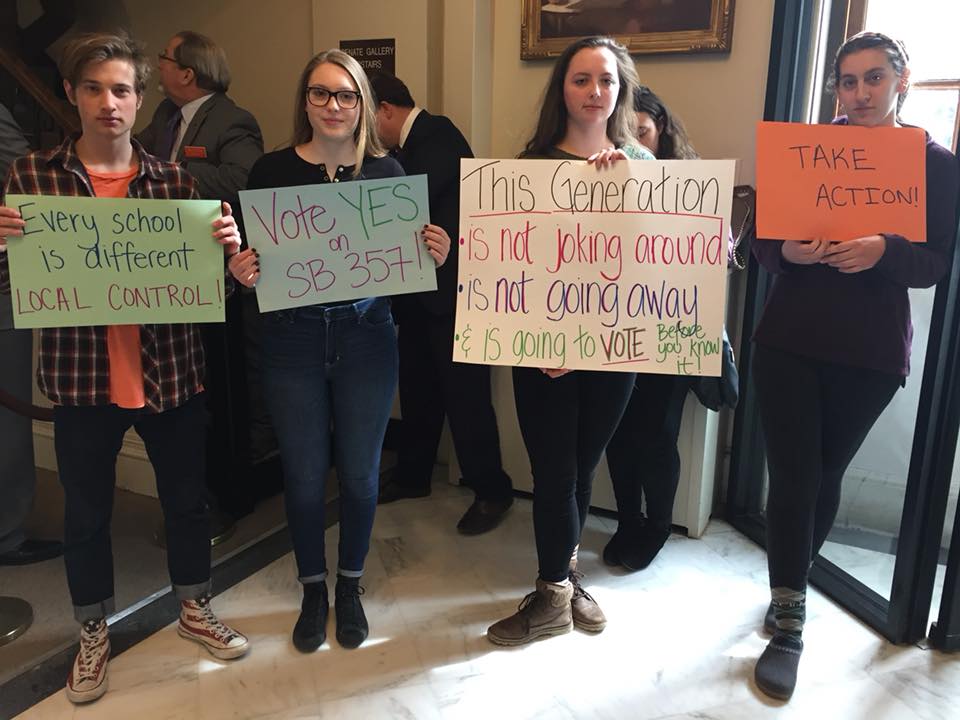
Concord, NH – Today, students, educators, and gun violence prevention advocates hosted a press call to react to Governor Sununu’s School Safety Preparedness Task Force, which was released late afternoon on Friday, June 29th ahead of the July 4th holiday. Key concerns include:
- Report skims over or avoids policy solutions to keep firearms out of schools and out of the hands of dangerous individuals (see page 16)
- Report falsely states public opinion is divided on background checks legislation and other measures, when 9 out of 10 Granite Staters have supported them for the last 5 years (see page 16)
- Report kicks the can down the road on these issues by recommending more study instead of citing ample data for immediate action steps (see legislative recommendation #2)
“Governor Sununu was very clear in his directive that task force members should avoid suggesting any policies that would conflict with the Governor’s firm stance of allowing anyone to carry a gun in New Hampshire, anywhere and at any time,” said Zandra Rice Hawkins, executive director of Granite State Progress. “But the Governor’s position is flat out wrong, and jeopardizes public safety. Real efforts should be taken to reduce the ever-present and justified fear of school shootings which students are forced to face every day.”
Reactions from students, educators, and gun violence prevention advocates:
Jonathan Weinberg, Concord High ’18 and Fellow, Granite State Progress: “As a student, school safety is important to me, which is why I was interested to see what NH was going to do to keep school environments safe. The report presented by the School Safety Preparedness Task Force attempted to disguise school related violence as a result of misplaced kindness within school communities. What I mean by that is the idea that just being nicer to one another will eliminate these atrocities, when we know that is not true and that easy access to firearms — especially high-capacity or military assault style weapons — is a much larger threat to public safety. I’m also disappointed that on page 32, the report discusses a citizen’s right to bear arms on a school campus and how it cannot be impeded. This mindset ignores the reality that guns in the hands of dangerous individuals and guns in school are the problem when it comes to mass school shootings, and inclusion of this misleading statement in the report shows the Governor and task force are not addressing the root of student safety concerns. I sincerely hope that we all can realize that gun violence prevention is not a partisan issue, but a matter of protecting our students, teachers, custodial staff, and administrators in schools. Governor Sununu should have never prevented his task force from exploring all aspects of school shootings and recommending appropriate measures to prevent a tragedy in New Hampshire.”
Jennifer White, Hopkinton High ’19 and Fellow, Granite State Progress: “One of the biggest problems that I saw arise this past year with the heightened discussions about school safety, was the idea that other students are to blame for school shootings when the attacker is a current or former student. This idea is simply a way to avoid addressing the clear root of the problem, which is our limited gun violence prevention laws, and blame the victims of these horrific events that they had no way to prevent. One of the suggestions outlined in the Task Force Report is the expansion of mental health programs in New Hampshire schools, including the Multi-Tiered System for Support and Behavioral Health, and the Positive Behavior Intervention System. These programs are focused on helping students who show signs of mental health concerns, in order to help prevent violence. The mental health of our students is, of course, extremely important, and the expansion of these types of programs would be great. However, it is also extremely important to realize that expansion of these programs likely will not noticeably contribute to the overall safety of schools. The relationship between gun violence and mental health is not just that people aren’t getting the help they need, but rather that regardless of this, they have quite easy access to such dangerous weapons when they are not in a state to safely operate them.”
Rep. Katherine Rogers (D-Concord), Prime Sponsor of Background Checks and Other Public Safety Laws: “Members of the NH legislature have explored options to expand our background checks, and also introduced legislation to increase liability for safe storage of firearms, keep firearms out of sensitive public places like elementary and high schools, establishments that serve alcohol, large sporting venues, places of worship, polling locations, and health care facilities. These common sense measures have broad public support, but lack the political will of politicians who put special interests ahead of the safety of students and constituents. These bills will be introduced again this next legislative session. We ask that Governor Sununu and the task force look at the legislation members of the General Court have introduced over the years, and find ways to work with us to advance smart, principled policies that respect 2nd Amendment rights while keeping our communities safe.”
Megan Tuttle, President of NEA-New Hampshire: “Recommendation 33, relative to the implementation of a school marshal program, would be a dangerous undertaking by any school community in New Hampshire. This initiative would enable school districts to employ, “an armed individual approved by the school and local police department but [not] a sworn law enforcement officer.” This may seem like a quick solution to combat active shooter situations; however it would, in reality, put students, teachers, and administrators’ lives in the hands of unqualified, armed person(s). It is also important to note the additional responsibility placed on a school district from this program, aforementioned in the report, “however, because a school marshal is neither a school resource officer nor a professional security contractor, an additional burden may be placed on a school or school district in assuring that the individual is trained to operate in a school environment.”
Zandra Rice Hawkins, Executive Director of Granite State Progress: “It is incredible that a task force report on school safety does not make an immediate recommendation for gun free schools in New Hampshire. The report recommends a “See Something, Say Something” style campaign for warning signs or pre-indicators. But Governor Sununu thinks school districts and local law enforcement should stand down when they see a gunman in a school, until that person opens fire. The task force report itself indicates that most mass shootings are over within 5 minutes, and that we measure the safety of students and the chances of survival in seconds. We cannot issue a report for the State of New Hampshire that asks educators and students to do one thing, then handcuffs them from being able to take action to protect themselves and their schools. We call on Governor Sununu and the School Safety Preparedness Task Force to advocate for state legislation in 2019 that clarifies local school districts can and should enforce gun free schools. This issue could also be resolved quickly by having the Attorney General clarify that the federal law applies here and that school districts and local law enforcement can and absolutely should enforce gun free schools.”
Jonathan and Jennifer noted that students collected hundreds of petitions that were submitted to Governor Sununu on gun free schools and other measures, but the Governor did not respond and did not stand with students on these critical public safety measures.
“Governor Sununu has taken very limited action on the repeated attempts of students who have been involved with the gun violence prevention movement, to meet with him and discuss the issue. We call on the Governor to hold a forum with students from the New Hampshire Social Justice League, and to acknowledge and address concerns from students who have been impacted enough by this issue to make them want to fight for change,” Jennifer said.
###


Students, Educators, Gun Violence Prevention Advocates React to Governor Sununu’s School Safety Preparedness Task Force Report
Leave a Comment
Last Updated: November 3, 2018 by Granite State Progress
Concord, NH – Today, students, educators, and gun violence prevention advocates hosted a press call to react to Governor Sununu’s School Safety Preparedness Task Force, which was released late afternoon on Friday, June 29th ahead of the July 4th holiday. Key concerns include:
“Governor Sununu was very clear in his directive that task force members should avoid suggesting any policies that would conflict with the Governor’s firm stance of allowing anyone to carry a gun in New Hampshire, anywhere and at any time,” said Zandra Rice Hawkins, executive director of Granite State Progress. “But the Governor’s position is flat out wrong, and jeopardizes public safety. Real efforts should be taken to reduce the ever-present and justified fear of school shootings which students are forced to face every day.”
Reactions from students, educators, and gun violence prevention advocates:
Jonathan Weinberg, Concord High ’18 and Fellow, Granite State Progress: “As a student, school safety is important to me, which is why I was interested to see what NH was going to do to keep school environments safe. The report presented by the School Safety Preparedness Task Force attempted to disguise school related violence as a result of misplaced kindness within school communities. What I mean by that is the idea that just being nicer to one another will eliminate these atrocities, when we know that is not true and that easy access to firearms — especially high-capacity or military assault style weapons — is a much larger threat to public safety. I’m also disappointed that on page 32, the report discusses a citizen’s right to bear arms on a school campus and how it cannot be impeded. This mindset ignores the reality that guns in the hands of dangerous individuals and guns in school are the problem when it comes to mass school shootings, and inclusion of this misleading statement in the report shows the Governor and task force are not addressing the root of student safety concerns. I sincerely hope that we all can realize that gun violence prevention is not a partisan issue, but a matter of protecting our students, teachers, custodial staff, and administrators in schools. Governor Sununu should have never prevented his task force from exploring all aspects of school shootings and recommending appropriate measures to prevent a tragedy in New Hampshire.”
Jennifer White, Hopkinton High ’19 and Fellow, Granite State Progress: “One of the biggest problems that I saw arise this past year with the heightened discussions about school safety, was the idea that other students are to blame for school shootings when the attacker is a current or former student. This idea is simply a way to avoid addressing the clear root of the problem, which is our limited gun violence prevention laws, and blame the victims of these horrific events that they had no way to prevent. One of the suggestions outlined in the Task Force Report is the expansion of mental health programs in New Hampshire schools, including the Multi-Tiered System for Support and Behavioral Health, and the Positive Behavior Intervention System. These programs are focused on helping students who show signs of mental health concerns, in order to help prevent violence. The mental health of our students is, of course, extremely important, and the expansion of these types of programs would be great. However, it is also extremely important to realize that expansion of these programs likely will not noticeably contribute to the overall safety of schools. The relationship between gun violence and mental health is not just that people aren’t getting the help they need, but rather that regardless of this, they have quite easy access to such dangerous weapons when they are not in a state to safely operate them.”
Rep. Katherine Rogers (D-Concord), Prime Sponsor of Background Checks and Other Public Safety Laws: “Members of the NH legislature have explored options to expand our background checks, and also introduced legislation to increase liability for safe storage of firearms, keep firearms out of sensitive public places like elementary and high schools, establishments that serve alcohol, large sporting venues, places of worship, polling locations, and health care facilities. These common sense measures have broad public support, but lack the political will of politicians who put special interests ahead of the safety of students and constituents. These bills will be introduced again this next legislative session. We ask that Governor Sununu and the task force look at the legislation members of the General Court have introduced over the years, and find ways to work with us to advance smart, principled policies that respect 2nd Amendment rights while keeping our communities safe.”
Megan Tuttle, President of NEA-New Hampshire: “Recommendation 33, relative to the implementation of a school marshal program, would be a dangerous undertaking by any school community in New Hampshire. This initiative would enable school districts to employ, “an armed individual approved by the school and local police department but [not] a sworn law enforcement officer.” This may seem like a quick solution to combat active shooter situations; however it would, in reality, put students, teachers, and administrators’ lives in the hands of unqualified, armed person(s). It is also important to note the additional responsibility placed on a school district from this program, aforementioned in the report, “however, because a school marshal is neither a school resource officer nor a professional security contractor, an additional burden may be placed on a school or school district in assuring that the individual is trained to operate in a school environment.”
Zandra Rice Hawkins, Executive Director of Granite State Progress: “It is incredible that a task force report on school safety does not make an immediate recommendation for gun free schools in New Hampshire. The report recommends a “See Something, Say Something” style campaign for warning signs or pre-indicators. But Governor Sununu thinks school districts and local law enforcement should stand down when they see a gunman in a school, until that person opens fire. The task force report itself indicates that most mass shootings are over within 5 minutes, and that we measure the safety of students and the chances of survival in seconds. We cannot issue a report for the State of New Hampshire that asks educators and students to do one thing, then handcuffs them from being able to take action to protect themselves and their schools. We call on Governor Sununu and the School Safety Preparedness Task Force to advocate for state legislation in 2019 that clarifies local school districts can and should enforce gun free schools. This issue could also be resolved quickly by having the Attorney General clarify that the federal law applies here and that school districts and local law enforcement can and absolutely should enforce gun free schools.”
Jonathan and Jennifer noted that students collected hundreds of petitions that were submitted to Governor Sununu on gun free schools and other measures, but the Governor did not respond and did not stand with students on these critical public safety measures.
“Governor Sununu has taken very limited action on the repeated attempts of students who have been involved with the gun violence prevention movement, to meet with him and discuss the issue. We call on the Governor to hold a forum with students from the New Hampshire Social Justice League, and to acknowledge and address concerns from students who have been impacted enough by this issue to make them want to fight for change,” Jennifer said.
###
Category: GSP Progress Report, Press Releases Tags: govenor, Governor Sununu, Gun Violence Prevention, school safety, social justice league, Sununu
Recent Posts
We’re on Facebook